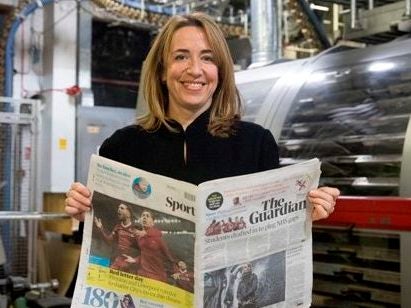
Guardian News and Media editor-in-chief Katharine Viner has said a hard paywall “isn’t really a conversation” at the news group anymore as she declared its “rewarding” donations method to be working.
Viner said analysis carried out by the group showed revenue from a paywall would equal what it currently earns from subscriptions and contributions, but without the advantage of “scale”.
Although she said she “wouldn’t rule anything out” when pressed on the Guardian’s business model at a Women in Journalism event hosted by London’s City University on Tuesday.
Viner said feedback from readers showed that people are choosing to give money for the Guardian’s “serious stuff”, such as reporting on environment, health, science and US President Donald Trump.
“That’s really great because that’s why we exist,” she said. “We exist to understand and contextualise the world and that’s what they tell us they appreciate.”
The Guardian’s editor of almost four years added that it was a “rewarding way to be funded”, especially after receiving feedback from readers who say they like the model and want to pay for investigative journalism.
She said readers have claimed it is the “only progressive publication working at scale”.
The Guardian publishes all of its content online, which is free to access, as well as on its free app. Viner said she “didn’t see it coming” that people would pay “so other people can get it for free, which was quite moving”.
Viner did not reject outright the notion that the group’s print products might eventually close, telling interviewer and Guardian colleague Jane Martinson: “I can’t say when that would be.
“Our print readers are incredibly devoted and it’s a really important part of their lives, but obviously particularly the issue around distribution becomes more difficult each year… [we are] certainly committed to it for now.”
Viner added that if the Guardian closed in print, there would be a strategy in place to protect the Observer as a distinct online presence, but reiterated that she was “not looking to a no-print future anytime soon”.
She also confirmed that Guardian News and Media is still on track to break even in April this year after a three-year plan to turn its finances around.
In 2018, the group made its presence felt in the UK media, with the Observer’s Cambridge Analytica, which made global headlines, and the Guardian’s coverage of the Windrush scandals.
The paper also turned tabloid, launched a new daily podcast and relaunched both its mobile app and international magazine Guardian Weekly.
But Viner said 2019 should be about consolidating those changes rather than another year of upheaval.
After Observer journalist Carole Cadwalladr’s story about data firm Cambridge Analytica harvesting the data of millions of Facebook users led to the social media giant’s chief executive Mark Zuckerberg to appear before Congress, Viner said the Guardian’s aim during the technology revolution is to “report on it and understand it, contextualise it and see it for what it is”.
“The whole technology revolution might end up being a really positive thing and I don’t want us to miss that if that’s the case, but at the same time I want us to report on what the big players are doing,” she said.
Viner was the first female editor in the Guardian’s almost 200-year history and said although there has been progress for women in the news industry over the last two decades she was “frustrated because it isn’t that much better”.
She went on: “You still see so much sexist coverage of women in the news and you see women being given roles and men being given different kinds of roles, but it’s obviously better and I’m just watching out for your generation to make it absolutely equal – no pressure,” she said in response to a City student’s question.
Asked if she ever faced sexism in her career, Viner said: “Yes I did – of course, I’m a woman”, but advised others against being as “outspoken” as she often was.
“I would be careful about encouraging others to do that because I think it can be quite dangerous in some workplaces.
“I used to complain so much if there was something sexist in the paper… but I worry that, the Guardian is a particular place, it’s always been better for women than lots of other places as you might expect – it’s a feminist organisation.
“So I would be careful about being so outspoken. You need to judge your own workplace.”
Sharing her tips for new journalists, Viner recommended working on data skills – “how to use data, how to read data sets, how to spot a story in it… the whole world is turning into data” – and personal skills such as “learning how to get someone to open up to you and tell you the truth when perhaps they don’t want to but they know they should”.
She also recommended developing a specialism or finding an area that not many other people know about, and being prepared to do “really menial things”.
Picture: Guardian
Email pged@pressgazette.co.uk to point out mistakes, provide story tips or send in a letter for publication on our "Letters Page" blog
